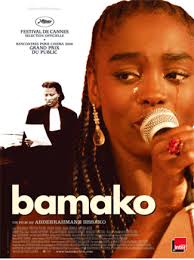
BAMAKO
Mali, 2006, 115 minutes, Colour.
Directed by Abderrahmane Sissako.
Bamako provides quite a demanding challenge to its audiences.
Director Abderrahmane Sissako has received many awards for his two previous films, Heremakono and La Vie sur Terre (including an Ecumenical Award). They have been described as poetic and political. Those are the words that are relevant to Bamako.
On the poetic side, the audience is immersed in the day-to-day detail of life in the capital of Mali. It ranges from the markets, homes to night clubs. Lots of the characters are found sitting around, observing life and people, part of the local African colour. Suddenly the credits and scenes from a Western set in Timbuktu starring Danny Glover are parachuted in to disconcert us – Westerns in Mali? Shootouts and the sudden deaths of innocent bystanders?
On the political side, the focus is on an outside court (the legal representatives dressed in traditional garb) with judges presiding over a hearing where some locals are making an appeal against the International Monetary Fund and the World Bank. The action moves between the court action and the events in the lives of the characters – especially a young singer at a club whose marriage is under stress.
The court sequences offer quite a number of speeches, both formal and informal (especially when an old man does not know the protocols of procedure and feels he must speech when he feels the urge). The speeches are defences of Africa, condemnations of colonialism and the highlighting of the disastrous consequences which still determine the fates of most African countries. Many examples are offered to critique the effects of globalisation as well as the presumptuous presuppositions of the international money organisations. A French barrister does get the opportunity to make a speech in the defence of these institutions, but it is clear where the intellectual as well as the emotional arguments are leading.
This is a cinematically eloquent piece of African storytelling but even more eloquent polemical challenge to the West and its governments and business organisations.